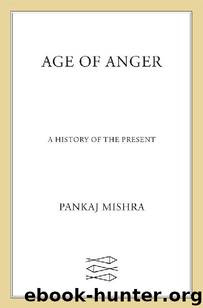Age of Anger: A History of the Present by Pankaj Mishra

Author:Pankaj Mishra [Mishra, Pankaj]
Language: eng
Format: epub
Tags: History, World, Politics & Social Sciences, Politics & Government, Specific Topics, Globalization, Social Sciences, Violence in Society, Modern (16th-21st Centuries), 21st Century, Revolutionary, International & World Politics
ISBN: 0241278139
Amazon: B01JTV79X6
Publisher: Penguin
Published: 2017-01-25T23:00:00+00:00
How to Develop, German-Style
In Heine’s politically conservative and stagnant country, however, the yearning for enchantment fed a massive religious revival that made the country seem medieval rather than modern. More than a million pilgrims went to Trier in 1844 to glimpse what they believed to be the Holy Robe of Christ. The sale of theological books rocketed. The spiritual unrest and longing for the infinite spilled over from political theory and art into political-philosophical speculation.
The modern world’s greatest philosophical system, implicit in all our political ideas and values today, was built during this time. The French Revolution may have announced the nineteenth century’s religion of the nation, and the cults of liberty and equality; but Germans brooding on their political inadequacy produced an Ur-philosophy of development: one to which liberal internationalists and modernization theorists as well as communist universalists and cultural nationalists could subscribe.
As the German states modernized in response to the Revolution and Napoleon’s depredations, Hegel came to see human history culminating in a new political system in Germany. Prepared by Luther’s Reformation the Germans, he maintained, were better placed spiritually and philosophically than the French for the tasks of reason and progress. Indeed, the historical trajectory of the Revolution and Germany’s development pointed to an imminent ‘end of history’, when all the major conflicts of history would be at last resolved.
Since Prussian and other German states appeared further than ever from this historical terminus in the 1830s and 1840s – an especially bleak time for German intellectuals – one of Hegel’s keen disciples readjusted his philosophical universal history. Germany’s backwardness, as he saw it, could only be eradicated by a working-class revolution – so far-reaching that it would amount eventually to the emancipation of humanity.
In the social and economic history written by Karl Marx – another form of German exceptionalism and system-building – the end of history became synonymous with a proletariat revolution and the creation of a communist society in Germany. Building brilliantly on the Romantics’ original critique of alienation, Marx came to see Germany as the catalyst of a worldwide transformation.
Marx’s collaborator, Engels, even claimed a sixteenth-century German (and devoutly Christian) peasant leader for the idea of Communism: Thomas Muenzer, he wrote, like a ‘genius’ understood that the ‘kingdom of God was nothing else than a state of society without class differences, without private property, and without superimposed state powers opposed to the members of society’.
The failure of the 1848 revolutions showed that much remained to be done before the Kingdom of God could be established on Earth. Marx and Engels posited several phases, such as class struggle, in the path towards it. Critics such as Max Stirner and Bakunin had argued that the task of securing individual freedom could not be entrusted to such ideological abstractions as class and state – ‘spooks’, as Stirner called them.
Furious with both Stirner and Bakunin, Marx underlined that the conditions must be right before man could become fully human; he should be free of economic and social constraints, and this freedom was not simply an act of individual will or assertion of ego.
Download
This site does not store any files on its server. We only index and link to content provided by other sites. Please contact the content providers to delete copyright contents if any and email us, we'll remove relevant links or contents immediately.
| Africa | Americas |
| Arctic & Antarctica | Asia |
| Australia & Oceania | Europe |
| Middle East | Russia |
| United States | World |
| Ancient Civilizations | Military |
| Historical Study & Educational Resources |
Cecilia; Or, Memoirs of an Heiress — Volume 1 by Fanny Burney(32548)
Cecilia; Or, Memoirs of an Heiress — Volume 2 by Fanny Burney(31947)
Cecilia; Or, Memoirs of an Heiress — Volume 3 by Fanny Burney(31932)
The Secret History by Donna Tartt(19053)
Sapiens: A Brief History of Humankind by Yuval Noah Harari(14368)
Leonardo da Vinci by Walter Isaacson(13318)
The Radium Girls by Kate Moore(12018)
Sapiens by Yuval Noah Harari(5366)
How Democracies Die by Steven Levitsky & Daniel Ziblatt(5215)
The Wind in My Hair by Masih Alinejad(5092)
Homo Deus: A Brief History of Tomorrow by Yuval Noah Harari(4908)
Endurance: Shackleton's Incredible Voyage by Alfred Lansing(4769)
Man's Search for Meaning by Viktor Frankl(4585)
The Silk Roads by Peter Frankopan(4526)
Millionaire: The Philanderer, Gambler, and Duelist Who Invented Modern Finance by Janet Gleeson(4468)
The Rape of Nanking by Iris Chang(4203)
Joan of Arc by Mary Gordon(4101)
The Motorcycle Diaries by Ernesto Che Guevara(4089)
Stalin by Stephen Kotkin(3957)
